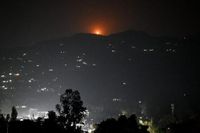New Delhi | On May 7, 2025, tensions between India and Pakistan escalated dramatically as India conducted military strikes on Pakistani-controlled Kashmir, following a militant attack that killed 26 people in Kashmir last month. The strikes, termed "Operation Sindoor" by the Indian government, targeted what it described as terrorist infrastructure, resulting in at least eight reported deaths and numerous injuries in Pakistan.
According to Indian officials, the precision strikes were aimed at known terrorist camps from where attacks against India have been orchestrated. "A little while ago, the Indian Armed Forces launched 'OPERATION SINDOOR', hitting terrorist infrastructure in Pakistan and Pakistan-occupied Jammu and Kashmir from where terrorist attacks against India have been planned and directed," the Indian government stated. However, Pakistan's Prime Minister Shehbaz Sharif condemned the airstrikes, labeling them as a "blatant act of war" and vowed that Pakistan would respond forcefully.
Pakistan's military reported that the strikes resulted in eight deaths, including a three-year-old girl, and left 35 others injured. The Pakistani Foreign Ministry denounced the attacks as unprovoked, asserting, "The deceitful enemy has carried out cowardly attacks," and emphasized that Pakistan has every right to retaliate. In a post on X, Prime Minister Sharif expressed that the entire nation stands united with its armed forces and that a robust response was imminent.
In retaliation, Pakistani officials claimed to have shot down five Indian jets, including three Rafale fighters, a Su-30, and a MiG-29, although India has not confirmed these claims. An Indian official later stated that one jet crashed in Indian-controlled Kashmir, with the injured pilot receiving medical attention. The Indian military, however, maintained that no civilian, economic, or military targets were hit during the strikes, focusing solely on terrorist camps.
The violence marks a significant escalation in hostilities between the two nuclear-armed neighbors, which have a long history of conflict over the disputed region of Kashmir. Since the militant attack last month, both sides have engaged in nightly gunfire along the Line of Control, the de facto border separating Indian and Pakistani-controlled Kashmir.
As the situation worsens, India’s Defence Ministry stated that its actions were measured and non-escalatory, emphasizing that no military facilities in Pakistan were targeted. However, reports indicate that the strikes hit various locations, including Bahawalpur, Kotli, Muzaffarabad, Bagh, and Muridke, prompting a state of emergency in Punjab, Pakistan's most populous province, where schools were closed and the leave of medical staff was canceled.
In the wake of the strikes, US President Donald Trump expressed concern, stating he hoped the conflict would end "very quickly." He remarked on the long-standing nature of the conflict, acknowledging that the two nations have been at odds for many decades. Meanwhile, UN Secretary-General António Guterres expressed his worry about the military operations, urging both countries to exercise maximum restraint to avoid further escalation.
Analysts suggest that the current situation could lead to a dangerous increase in military confrontations, as both nations possess significant nuclear arsenals—India with 180 warheads and Pakistan with 170, according to estimates by the Federation of American Scientists. The ongoing conflict has raised fears of a potential full-scale war, reminiscent of previous confrontations between the two countries.
In recent developments, Indian broadcaster CNN News-18 reported that India's strikes may have killed up to 12 militants and injured at least 55 people. However, these figures have not been independently verified. The Indian Army has claimed that three civilians were killed in retaliatory fire from Pakistani troops across the Line of Control.
As the international community watches closely, the dynamics between India and Pakistan remain fraught with tension. The recent military actions have heightened fears of a broader conflict, with both countries prepared to defend their interests vigorously. The situation continues to unfold, and the potential for further military engagement looms large.
In conclusion, the events of May 7, 2025, mark a critical juncture in the India-Pakistan relationship, with both nations poised for possible retaliation. The global community is left hoping for a peaceful resolution, but the realities on the ground suggest that the path to de-escalation will be fraught with challenges.






